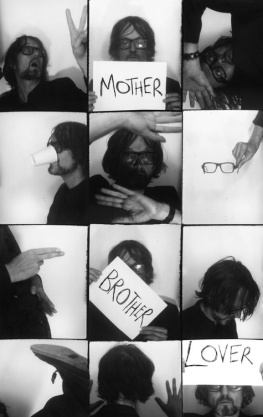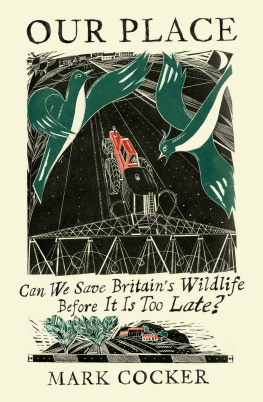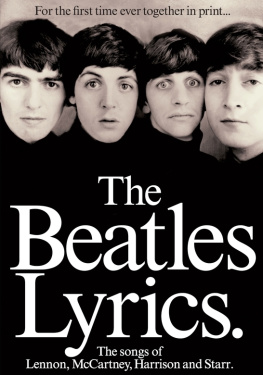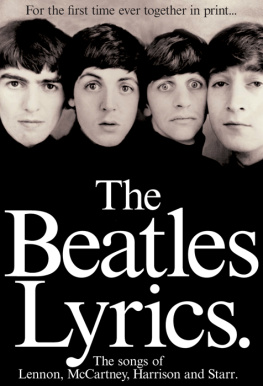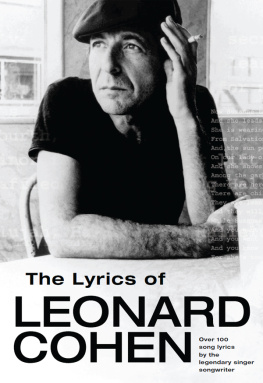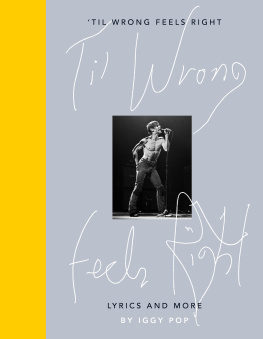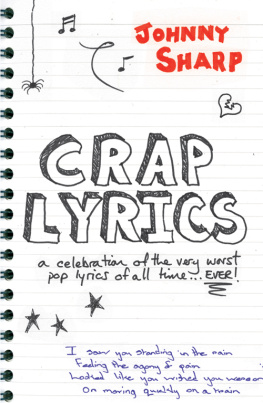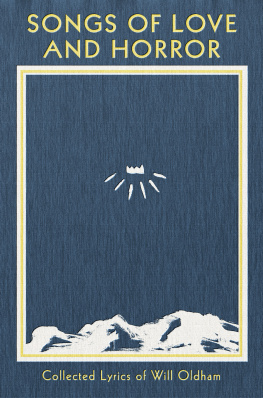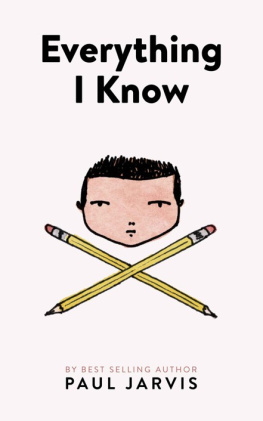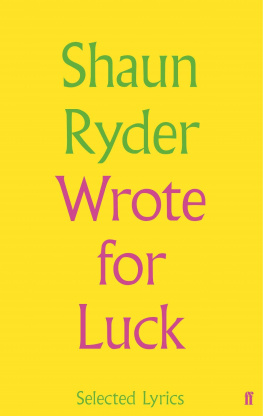I never intended to be a lyricist. I had wanted to be a pop star from about the age of eight (thats probably when I first saw the Beatles film Help!) but, when I finally managed to cajole three school friends into being in a group with me back in 1978, we were too inept to play other peoples songs and so had to write our own material. Because it was my group and I was the singer, I ended up having to write the words. So I found myself in the position that a lot of songwriters start off in: you dont particularly want to do the job but because a song isnt really a song until its got some lyrics, its down to you to write them. And this kind of Aw, Mum, do I really have to do my homework? attitude stays with you throughout the years. If you ever have the misfortune to be in a recording studio where work has ground to a halt, it wont be because the drummer has drummers block or the guitarist has guitarists block, only writers get blocked. Many of the lyrics in this book were hastily written the night before a recording session because Id been putting off writing them until the very last minute. Its strange that the most intelligible part of a song the words, those things that people use to communicate with each other all the time should be seen as the most boring and chore-like aspect of the songwriting process by musicians themselves. And I think thats down to a very simple fact: the words to a song are not that important. Not that important but youve got to have them anyway theyre a contractual obligation, a necessary evil, an afterthought.
Take an undisputed rock classic like Louie, Louie by the Kingsmen. The lyrics to that song are so indecipherable that they actually prompted an FBI investigation into their allegedly obscene content back in the early 1960s. (It seems that people could hear such immortal lines as I felt my boner in her hair.) After a thirty-one-month-long investigation, the FBI concluded that they were unable to interpret any of the wording in the record. In other words you cant tell a word of what the singer is singing and it doesnt matter.
But once youve realised that the words are not so important then the real fun of lyric-writing can begin. If nobodys listening you can say whatever you want. My first attempts roughly coincided with my first romantic dealings with the opposite sex. I was struck by the massive discrepancy between the way relationships were depicted in the songs Id heard on the radio and the way I was experiencing them in real life (could have been my technique, I suppose.) So I decided to try and redress the balance, to put in all the awkward bits and the fumblings. Maybe lyrics werent that important to a songs success but I realised that they were important to me. I was always looking for something in them that generally wasnt there. I had loved pop music from an early age and now I wanted it to go through puberty with me so I ended up documenting my puberty through pop music itself. This became the blueprint for the way I worked: an attempt to marry inappropriate subject matter to fairly conventional pop song structures. To try and create the kind of pop music I wished had been there for me in my hour of need.
This kind of friction between the words and the music presents problems for me when displaying the lyrics in isolation. Ever since lyric sheets started to be included in my record releases, I have included the instructions, NB Please do not read the lyrics whilst listening to the recordings. This is because the words only exist to be part of something else, a song, and when you see them on a printed page you are seeing them taken out of their natural habitat away from that something else. Sometimes they work with the music, sometimes they work against it but seeing a lyric in print is like watching the TV with the sound turned down: youre only getting half the story. You wouldnt listen to the drums on a track in isolation from all the other instruments that were playing at the same time. I especially dont want people to extract the words from their natural habitat whilst the music is actually playing. I remember buying Pink Floyds Dark Side of the Moon as a teenager and rushing home to play it. I sat with the gatefold sleeve open on my knees, poring over Roger Waters words whilst the album revolved on the record deck and, to my horror, it made the lyrics seem awful. What had seemed profound and meaningful on the bus ride home from town now seemed clunky and awkward: the syntax mangled and the words crudely shoehorned to fit the rhythm of the music or the vocal melody. Usually when you read something it has the natural tempo of speech, but in a song it has to become subservient to the rhythm of the music it goes with. This concern about how the lyrics were perceived also fed into how they were presented on the lyric sheets. Here is an example from the album His n Hers:
Joyriders. We like driving on a Saturday night, past the Leisure Centre, left at the lights. We dont look for trouble but if it comes we dont run. Looking out for trouble is what we call fun. Hey you, you in the Jesus sandals, wouldnt you like to come over and watch some vandals smashing up someones home? We cant help it, were so thick we cant think, cant think of anything but shit, sleep and drink. Oh, and we like women; up the women we say and if we get lucky we might even meet some one day. Hey you, you in the Jesus sandals etc. Mister, we just want your car cos were taking a girl to the reservoir. Oh, all the papers say its a tragedy but dont you want to come and see? Mister we want your car etc. (x 3)
I have always had an extreme aversion to the way lyrics are often typeset to resemble poetry. Lyrics are not poetry: they are the words to a song. This obviously presented challenges regarding this collection a whole book consisting of page after page of text set as above would not be a very pleasant reading experience so, with the help of the publisher, I have attempted to arrive at a form that presents the words in an intelligible manner, designed to work on the page rather than mimic the way they come across in the songs. I guess the success of this approach rather depends on your level of familiarity with the source material but I hope it helps the words to stand up on their own at last. These are still the words to songs but, collected between these covers at least, they are now a written work in their own right. (Definitely not poetry though!)
The lyrics are presented in chronological order. I have spared you my very first attempts, dating from 1978, which were either very silly (e.g. Shakespeare Rock: Gotta baby only one thing wrong: she quotes Shakespeare all day long. I said, Baby whyre you ignoring me? She said, To be or not to be.) or embarrassingly earnest (e.g. Life is a Circle: Life is a circle youre caught on. Life is a road thats much too long. It winds, goes ahead only stops when youre dead.) So the collection spans the years 1983 to 2009. Ive never kept a journal or diary, so the songs are the nearest thing I have to a record of my personal development (or lack of it). If I have learnt anything about songwriting in the interim, it is that in order to ring true it must be rooted in your own personal experience (but not take the place of it). I would subscribe to Leonard Cohens view, Art is just the ash left if your life is burning well. Life is the important bit and detail is key as only a true eye-witness would notice apparently insignificant minutiae. When you put such details into songs, they bestow authenticity. I think that you dont really have much control over what does and does not stick in your mind and its the haphazard nature of memory that gives you an original voice provided that you can learn to recognise it and use it. Not all the things your brain presents for your consideration are particularly palatable or polite but if they do come to the forefront of your consciousness then they are worth taking notice of. The worst thing you can do is to make a conscious effort to ignore all that stuff and write properly, to try to do it how its supposed to be. That happens a lot or maybe people dont value their own experience enough to deem it worthy of being written down. It wasnt until I moved away from Sheffield in 1988 that I began to write explicitly about the place I couldnt really see it clearly until then. Then I wrote about it in a frantic attempt to stop it fading from my memory. I couldnt wait to get away from there, yet then I obsessively recreated it in my mind. Only better. Its good to keep in all the awkward moments and false starts but you

